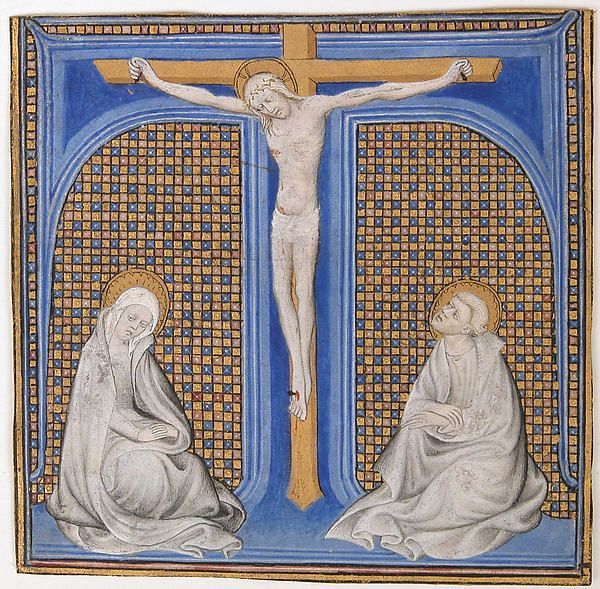Gethsemane
Prayer: the usual preparatory prayer. I will beg God our Lord for grace that all my intentions, actions, and operations may be directed purely to the praise and service of his Divine Majesty.
History: Christ our lord descended with the eleven disciples from Mt. Zion, where the supper was held, to the valley of Josaphat. Eight of the disciples were left at a place in the valley, and the other three in a part of the garden. Then Jesus began His prayer, and his sweat became as drops of blood. Three times He prayed to His Father and went to rouse His disciples from sleep.
Composition of place: I will consider the way from Mt. Zion to the Valley of Josaphat, likewise the garden, its breadth, its length, and appearance.
Prayer of petition: I will ask for the grace I desire. In the Passion it is proper to ask for sorrow with Christ in sorrow, anguish with Christ in anguish, tears and deep grief because of the great affliction Christ endures for me.
From Mount Zion to the Mount of Olives
When Jesus had finished on mount Zion the Supper which was the memorial of His passing, He said, “Arise, let us go…” (John 14: 31) the little group crossed the city, at that hour completely deserted. It was about ten o’clock in the evening. The bright moon, now at its full, gave abundant light. Their walking was slow. They had not far to go and Jesus had much to say… This walking occupies three chapters in the Gospel of Saint John.
In two chapters are written his conversation with his disciples, and among others things He told them:
– “I am the vine, you are the branches. He who abides in me, and I in him, he it is that bears much fruit, for apart from me you can do nothing.” (John 15: 5)
- “This is my commandment, that you love one another as I have loved you. Greater love has no man than this, that a man lay down his life for his friends.” (John 15: 12-13)
– “’A servant is not greater than his master.’ If they persecuted me, they will persecute you.” (John 15: 20)
- “I have yet many things to say to you, but you cannot bear them now. When the Spirit of truth comes, he will guide you into all the truth.” (John 16: 12-13)
During this last walking Jesus spoke with his Father. It is a prayer and this prayer is witten in this third chapter:
– “He lifted up his eyes to heaven and said, “Father, the hour has come; glorify your Son that the Son may glorify you, since you have given him power over all flesh, to give eternal life to all whom you have given him. And this is eternal life, that they know you the only true God, and Jesus Christ whom you have sent.” (John 17: 1-3)
Gethsemane
As is his custom, Jesus enters the garden with the Apostles.
Gethsemane means: “oil-press”. It was an enclosed part of the great olive plantation, which covered the whole mountain. Here a press has been installed to deal with the olives that have been gathered. Here was abundant shade.
Jesus was accustomed to withdraw to Gethsemane when He needed a secure retreat. Sometimes He would decide to spend the night there. Then Gethsemane became a sacred dormitory.
At first everything seems to happen as usual, except that Jesus, who normally loves to pray alone, now takes with Him Peter, James and John, his favorites.
“Stay you here” he beg of them “and watch with me.” (Mk 14: 34) He has often spoke of “watching” before, but He did not say “with me.” Here is not just a matter of vigilance, it is pity that the savior implores.
Here begins a super human agony. He does not merely kneel, but He “falls” upon his knees, and lies prostrate with His face to the ground. And He weeps with his whole being. The tears pour not only from his eyes but from his whole body, bringing with them drops of blood.
And Christ says, “My soul is sorrowful even unto death.”
The Psalm 54, pre-announced his words, “my heart is troubled within me: and the fear of death is fallen upon me. Fear and trembling are come upon me: and darkness has covered me.”
The son of Man is come to adopt man, and He takes as his own all the burdens of his sons.
Then, Christ has three painful visions
First, his sufferings
He wants to suffer all that He can and He uses His omnipotence to increase, not to alleviate, His suffering. He wants to suffer at that moment, what he will suffer afterwards in detail. He sees Himself betrayed, bound, led from tribunal to tribunal, calumniated, denied, spat upon, asa foll, as worse than the worst of men, scourged, crowned with thorns, nailed to the Cross, and finally dying in an agony of torment. And he suffers now whatever each member of his mystical body will suffer down the centuries, even to the end of the world. Saul, Saul, why do you persecute me? He suffers with his martyrs. He suffers with those who are persecuted for his cause. And we can see that his suffering were greater than ours, because his Heart was infinitely more sensitive than ours, and his knowledge was more penetrating than ours.
Then, Christ says, “My soul is sorrowful even unto death.”
Second, the sins of men
He has come to atone for sin and to destroy its empire. “Behold the Lamb of God, behold him Who takes away the sin of the world.” (John1, 29)
He came for sinners and He knew, all along, that He must fully satisfy for each and every one of them.
Now he is brought face to face with God’s Justice and Sanctity. His face is crushed to the ground beneath the weight of the almost infinite number of the sins of men.
Who can imagine his horror when He finds His eyes and hands and feet, his heart and souls, as it they were the eyes, hands, feet, heart and soul not of god, but of the evil one. (Cardinal Newman, “The Interior Sufferings of Christ”) And we too, sinners, were present to Him there.
Then, Christ says, “My soul is sorrowful even unto death.”
Third, the ingratitude of men
If only He knew that there would be some poor return of love and gratitude from those for whose sake He was suffering.
But, he looks around…
Where are the Apostles? The main group of the Apostles has remained near the entrance to the garden, and they have forgotten Him.
The three special friends, Peter, James and John, are very close. They are close enough to hear the groans of Jesus and to realize his terrible suffering. But they are asleep. These three, Peter and the two sons of Zebedee, whom he has associated with every important step in his public life, whom he has made the partners of His secrets, who alone witnessed the resurrection of the daughter of Jairus and the Transfiguration, to whom He has now given a proof of His confidence by allowing them to see His human infirmity: these three forsake Him. They do not understand his grief. Only once in his life Jesus has asked for their help, but they did not give it to Him.
And Judas is plotting against Him
He looks around the ages
And He sees ingratitude and indifference from an overwhelming majority of mankind. Millions will not even know Him; others will reject Him; many, even among friends, will prove ungrateful.
We can apply to him the words of the Prophet Isaiah, “I looked about, and there was no one to help. I sought, and there was none to give aid.” (63: 5) And the words of the palm (29: 10) would have come to his mind, “What profit is there in my blood.”
Then, Christ says, “My soul is sorrowful even unto death.”
These are the three visions that oppress the savior to death. Look at him prostrate on His face. The whole drama is enacted between Jesus and Heaven…
And now He prays to His Father. He appeals to the tenderness of the Father. “Abba, Pater, Father.” And he adds, “All things are possible to you, remove this chalice from me.”
But this cry of distress is modified by a condition: “If it is possible.”
“Abba, Father, all things are possible to you; remove this chalice of sufferings from me; yet not what I will, but what you will.” (Mk 14: 36)
It is written (Philippians 2:8): “He became obedient” to the Father “unto death.”
His offering was an offering of obedience. He came to fulfill the plan of the Heavenly father, and now, he will accomplish it. In order to heal human race from their disobedience, his obedience was unto death, “as by the disobedience of one man, many were made sinners: so also, by the obedience of one, many shall be made just.” (Romans 5:19)
We can see this encounter between the superior will of our Lord, determined to suffer and die in obedience to His Father, and his inferior will, seeking to flee from what is so repugnant to nature.
In the midst of this conflict, the tormented Heart of Jesus begins to beat with vehemence.
Then, drops of blood roll down. If his Heart does not break, it is because the Omnipotent Will of Christ wants to drink this chalice completely.
It is the Passion of the Divine Heart to which we must especially direct our attention in our contemplation of the Agony in the Garden. We are called to contemplate the depth of his sorrow. We are called to contemplate the depth of his love.
With a dialogue I will speak with Him.
And, I can renew my petition: sorrow with Christ in sorrow, anguish with Christ in anguish, tears and deep grief because of the great affliction Christ endures for me.
Also, I can reflect on myself and ask…
What have I done for Christ?
What am I doing for Christ?
What will I do for Christ?

Take, Lord,
and receive all my liberty, my memory, my understanding, and my entire will, all that I have and possess. Thou hast given all to me. To Thee, O Lord, I return it. All is Thine, dispose of it wholly according to Thy will. Give me Thy love and Thy grace, for this is sufficient for me.
(Spiritual Exercises #234. Louis Puhl SJ, Translation.)



